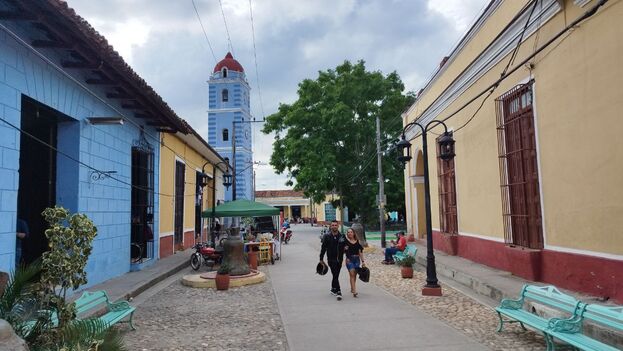
![]() 14ymedio, Mercedes García, Sancti Spíritus, 21 January 2023 — Food prices continue to increase and authorities in the city of Sancti Spíritus try to put the brakes on inflation by pressuring private business owners to lower their prices. The official call, however, has not been echoed in the sector hit hard by the high cost of raw materials and taxes.
14ymedio, Mercedes García, Sancti Spíritus, 21 January 2023 — Food prices continue to increase and authorities in the city of Sancti Spíritus try to put the brakes on inflation by pressuring private business owners to lower their prices. The official call, however, has not been echoed in the sector hit hard by the high cost of raw materials and taxes.
Susana and her husband sell crackers and on Thursday were in a meeting called by the local authorities. “They told us we had to lower our prices because it is a directive of the Communist Party,” they told 14ymedio. “But we can’t, until recently we were buying wheat flour from a mipyme [a micro or small business] that sold it for 135 pesos but now we must pay more.”
“We’re between a rock and a hard place, because if we lower the price we practically won’t have any income. Everything we earn we would need to invest in purchasing ingredients for the crackers, that is, we’d work for nothing,” she says. “Between the raw materials and taxes there is no margin for a discount.”
“It is not only about the products we must pay high prices for to maintain afloat, but also that this work requires a lot of sacrifice: waking up very early to knead, shape and bake the crackers,” she stated. “Then, the time we must devote to sales, hours and hours on our feet and in contact with customers, who many times are bothered by the prices.”
“They are having these meetings with all those who are self-employed in Sancti Spíritus and the tone is not one of a suggestion nor recommendation, but of an imposition,” bemoaned Susana. “They don’t address us like people who must go through a thousand and one difficulties to keep their business open and who, in addition, offer a service: our crackers are the snacks for many children in this neighborhood take to school.”
On Friday, Vicente’s shop, which mostly sells sweets and candy, was a hotbed of activity because many who are self-employed arrived there to talk about the meeting the day before. The discontent with the requested adjustment seems to be generalized among a sector in which many believe that they are being blamed for inflation.
“They tell us we must lower prices, but when I go to the MLC [freely convertible currency] store I am forced to pay high prices for products I need to make the sweets I sell here,” claims Vicente. “There are products I cannot find anywhere else and the so-called wholesale market they were going to open for business owners has been a complete failure.”
The customers feel caught in the middle. “Prices are through the roof and they have increased a lot since the beginning of the year, but if the government continues to pressure private businesses we will end up without the few cafeterias that remain open to sell something,” acknowledged a young man who paid 120 pesos for a small pack of cookies at a private shop, near the city center. “Of course I want to pay less, but we could reach a point when even if we have the money we can’t find something like this.”
The battle to regulate the prices of the private sector has been going on for several years and at time is reinforced, languishing before the reality of inflation or adding new official mechanisms to penalize those who do not adopt the price caps imposed by the authorities.
“We need to confront those prices that continue to rise for certain activities and by certain indiscriminate people so they obtain high profits,” the Minister of Finance and Prices, Meisi Bolaños Weiss, stated in January 2020 during an episode of the Mesa Redonda (Roundtable) program on State TV.
To ensure compliance with the measure, the government shared several telephone numbers for reporting vendors who do not comply with the order and also launched an army of inspectors to visit businesses and impose fines for merchants, but none of these practices have been fruitful.
Now they add local meetings and direct pressure on each merchant which, for the moment, seem to be causing more discontent among the entrepreneurs than beneficial results for the customers’ pockets. The next step for the authorities could be much more radical, in a context in which inflation seems to be out of control.
Translated by: Silvia Suárez
____________
COLLABORATE WITH OUR WORK: The 14ymedio team is committed to practicing serious journalism that reflects Cuba’s reality in all its depth. Thank you for joining us on this long journey. We invite you to continue supporting us by becoming a member of 14ymedio now. Together we can continue transforming journalism in Cuba.
